(完整版)乔布斯中英文简介
乔布斯中英文介绍

He holds up an iPhone and told us Jobs was back,Apple was back,innovation was back!
He holds up an iPhone and told us Jobs was back,Apple was back,innovation was back!
Jobs has led and launched the Macintosh computer (Macintosh), iMac, iPod, iPhone, and the world of electronic products, profoundly changes the modern communication, entertainment and way of life.
活着就为
To change the world alive!
改变世界
Profession 职业
Steve jobs, was born on February 24 , 1955 , San Francisco , California , United States inventor and entrepreneur , the apple co-founder and former CEO of the company. 史蒂夫·乔布斯,1955年2月24日出生于美国加利福尼 亚州旧金山,美国的发明家、企业家,美国苹果公司的 联合创始人及前CEO。
Honor 荣誉
Evaluate评价
End of life 生命尾声
Stay hungry, stay foolish
求知若饥,虚心若愚
The end
Achievement 成就
改变世界的天才乔布斯中英文课件
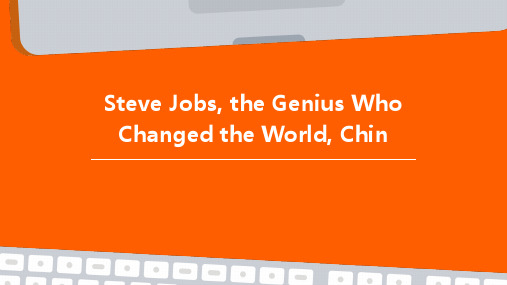
iPad
The iPad launched the tablet market and created a new category of mobile computing devices.
Apple Store
01
The Apple Store revolutionized retailing by creating an immersive experience for customers.
The iPhone introduced a new era of smartphones, combining multiple functionalities into a single device.
iPod
The iPod revolutionized the music industry by making digital music portable and easy to access.
Disrupted the music industry
The iPod and iTunes Store disrupted the music industry by shifting consumer behavior towards digital music.
Transformed mobile phones
Charismatic communicator
Jobs had the rare ability to captivate an audience with his visionary speeches and presentations. He could articulate complex ideas in simple terms that resonated with people.
StevenPaul乔布斯生平(中英文对照)
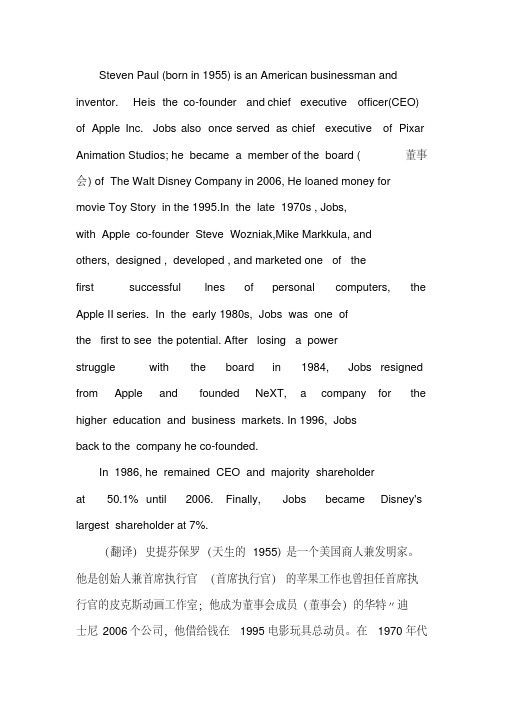
Steven Paul (born in 1955) is an American businessman and inventor. He i s the co-founder and chief executive officer(CEO) of Apple Inc. Jobs also once served as chief executive of Pixar Animation Studios; he became a member of the board (董事会) of The Walt Disney Company in 2006, He loaned money formovie Toy Story in the 1995.In the late 1970s , Jobs,with Apple co-founder Steve Wozniak,Mike Markkula, andothers, designed , developed , and marketed one of thefirst successful lnes of personal computers, the Apple II series. In the early 1980s, Jobs was one ofthe first to see the potential. After losing a powerstruggle with the board in 1984, Jobs resigned from Apple and founded NeXT, a company for the higher education and business markets. In 1996, Jobsback to the company he co-founded.In 1986, he remained CEO and majority shareholderat 50.1% until 2006. Finally, Jobs became Disney's largest shareholder at 7%.(翻译)史提芬保罗(天生的1955)是一个美国商人兼发明家。
乔布斯英文介绍!!超经典!!
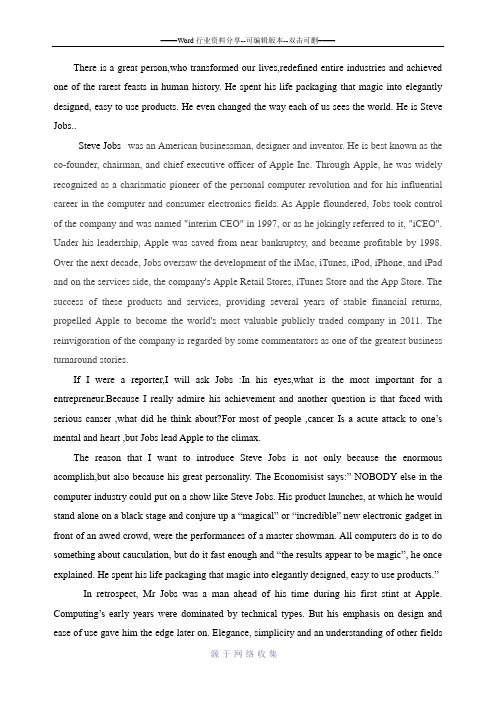
There is a great person,who transformed our lives,redefined entire industries and achieved one of the rarest feasts in human history. He spent his life packaging that magic into elegantly designed, easy to use products. He even changed the way each of us sees the world. He is Steve Jobs..Steve Jobs was an American businessman, designer and inventor. He is best known as the co-founder, chairman, and chief executive officer of Apple Inc. Through Apple, he was widely recognized as a charismatic pioneer of the personal computer revolution and for his influential career in the computer and consumer electronics fields.As Apple floundered, Jobs took control of the company and was named "interim CEO" in 1997, or as he jokingly referred to it, "iCEO". Under his leadership, Apple was saved from near bankruptcy, and became profitable by 1998. Over the next decade, Jobs oversaw the development of the iMac, iTunes, iPod, iPhone, and iPad and on the services side, the company's Apple Retail Stores, iTunes Store and the App Store. The success of these products and services, providing several years of stable financial returns, propelled Apple to become the world's most valuable publicly traded company in 2011. The reinvigoration of the company is regarded by some commentators as one of the greatest business turnaround stories.If I were a reporter,I will ask Jobs :In his eyes,what is the most important for a entrepreneur.Because I really admire his achievement and another question is that faced with serious canser ,what di d he think about?For most of people ,cancer Is a acute attack to one’s mental and heart ,but Jobs lead Apple to the climax.The reason that I want to introduce Steve Jobs is not only because the enormous acomplish,but also because his great personality. Th e Economisist says:” NOBODY else in the computer industry could put on a show like Steve Jobs. His product launches, at which he would stand alone on a black stage and conjure up a “magical” or “incredible” new electronic gadget in front of an awed crowd, were the performances of a master showman. All computers do is to do something about cauculation, but do it fast enough and “the results appear to be magic”, he once explained. He spent his life packaging that magic into elegantly designed, easy to use pro ducts.”In retrospect, Mr Jobs was a man ahead of his time during his first stint at Apple. Computing’s early years were dominated by technical types. But his emphasis on design and ease of use gave him the edge later on. Elegance, simplicity and an understanding of other fieldscame to matter in a world in which computers are fashion items, carried by everyone, that can do almost anything. “Technology alone is not enough,” said Mr Jobs at the end of his speech introducing the iPad, in January 2010. “It’s technolo gy married with liberal arts, married with humanities, that yields the results that make our hearts sing.” It was an unusual statement for the head of a technology firm, but it was vintage Steve Jobs.He attributed his success to an obsessive attention to detail , his pursuit of perfection and his flair for innovation.He said- "I want to make icons do look lick with his tongue"; To be able to sleep at night, to the aesthetic and quality throughout the pursuit of excellence""Do not let the noise of others opinions drown your inner voice, heart and intuition to have the courage to listen to the call." - He is Apple's "The Godfather" Jobs. "A pirate, a paranoid, a perfect combination of art and technology of IT leaders, a person who changed the world." He said in his youth that he wanted to “put a ding in the universe” did just that.到目前为止,世界上还没有哪个计算机行业或者其他任何行业的领袖能够像乔布斯那样举办出一场万众瞩目的盛会。
stevejobs生平简介英文翻译

steve jobs生平简介英文翻译Steve Jobs, born on February 24, 1955, was an American business magnate, industrial designer, and inventor. He is best known as the co-founder, chairman, and CEO of Apple Inc, a company that revolutionized the technology industry with its innovative products and designs。
Jobs was born and raised in San Francisco, California. He was adopted by Paul and Clara Jobs, who encouraged his interest in electronics from a young age. In high school, he attended the Homestead High School in Cupertino, California. It was during his time there that he met Steve Wozniak, a fellow electronics enthusiast and future co-founder of Apple。
After graduating from high school, Jobs enrolled at Reed College in Portland, Oregon. However, he dropped out after just six months because he didn't see the value in spending his parents' hard-earned money on formal education. Instead, he continued attending classes thatinterested him, such as calligraphy, which later influenced the typography of Apple's products。
乔布斯英文介绍!!超经典!!
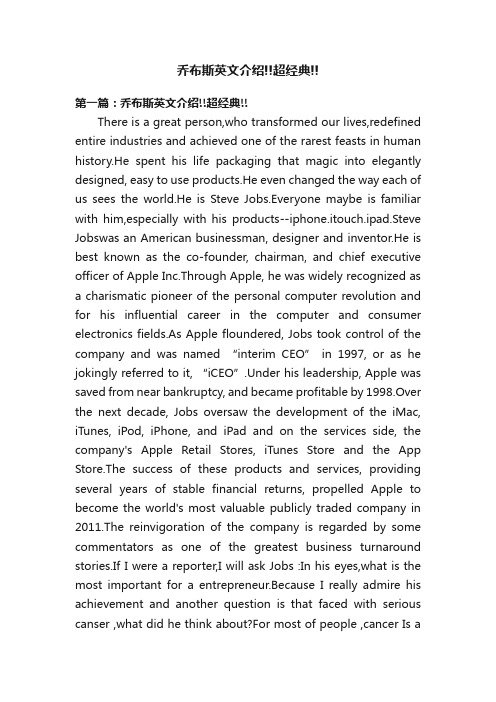
乔布斯英文介绍!!超经典!!第一篇:乔布斯英文介绍!!超经典!!There is a great person,who transformed our lives,redefined entire industries and achieved one of the rarest feasts in human history.He spent his life packaging that magic into elegantly designed, easy to use products.He even changed the way each of us sees the world.He is Steve Jobs.Everyone maybe is familiar with him,especially with his products--iphone.itouch.ipad.Steve Jobswas an American businessman, designer and inventor.He is best known as the co-founder, chairman, and chief executive officer of Apple Inc.Through Apple, he was widely recognized as a charismatic pioneer of the personal computer revolution and for his influential career in the computer and consumer electronics fields.As Apple floundered, Jobs took control of the company and was named “interim CEO” in 1997, or as he jokingly referred to it, “iCEO”.Under his leadership, Apple was saved from near bankruptcy, and became profitable by 1998.Over the next decade, Jobs oversaw the development of the iMac, iTunes, iPod, iPhone, and iPad and on the services side, the company's Apple Retail Stores, iTunes Store and the App Store.The success of these products and services, providing several years of stable financial returns, propelled Apple to become the world's most valuable publicly traded company in 2011.The reinvigoration of the company is regarded by some commentators as one of the greatest business turnaround stories.If I were a reporter,I will ask Jobs :In his eyes,what is the most important for a entrepreneur.Because I really admire his achievement and another question is that faced with serious canser ,what did he think about?For most of people ,cancer Is aacute attack to one’s mental and heart ,but Jobs lead Apple to the climax.The reason that I want to introduce Steve Jobs is not only because the enormous acomplish,but also because his great personality.The Economisist says:” NOBODY else in the computer industry could put on a show like Steve Jobs.His product launches, at which he would stand alone on a black stage and conjure up a “magical” or “incredible” new electronic gadget in front of an awed crowd, were the performances of a master showman.All computers do is to do something about c auculation, but do it fast enough and “the results appear to be magic”, he once explained.He spent his life packaging that magic into elegantly designed, easy to useproducts.”In retrospect, Mr Jobs was a man ahead of his time during his first stint at Ap puting’s early years were dominated by technical types.But his emphasis on design and ease of use gave him the edge later on.Elegance, simplicity and an understanding of other fields came to matter in a world in which computers are fashion items, carried by everyone, that can do almost anything.“Technology alone is not enough,” said Mr Jobs at the end of his speech introducing the iPad, in January 2010.“It’s technology married with liberal arts, married with humanities, that yields the results that m ake our hearts sing.” It was an unusual statement for the head of a technology firm, but it was vintage Steve Jobs.He attributed his success to an obsessive attention to detail , his pursuit of perfection and his flair for innovation.He said-“I want to mak e icons do look lick with his tongue”;To be able to sleep at night, to the aesthetic and quality throughout the pursuit of excellence“"Do not let the noise of others opinions drown your inner voice, heart andintuition to have the courage to listen to the call.”-He is Apple's “The Godfather” Jobs.“A pirate, a paranoid, a perfect combination of art and technology of IT leaders, a person who changed the world.” He said in his youth that he wanted to “put a ding in the universe” did just that.到目前为止,世界上还没有哪个计算机行业或者其他任何行业的领袖能够像乔布斯那样举办出一场万众瞩目的盛会。
史蒂夫乔布斯的英语简介英文介绍

史蒂夫乔布斯的英语简介英文介绍通过以下的中英文简介,你是不是也对乔布斯简介有了更深入的了解了呢?以下是店铺给大家带来史蒂夫乔布斯的英语介绍,供大家参阅!史蒂夫乔布斯的英语简介Steven Paul Jobs (English: Steven Paul Jobs, February 24, 1955 - October 5, 2011), referred to as Steve Jobs (English: Steve Jobs, the co-founder of apple, and apple's board chairman, former chief operating officer, and former chairman and chief executive of pixar animation studios (pixar animation studios has been acquired by Disney in 2006 ). Jobs also was a board member of the Disney company and the largest individual shareholder . Steve jobs is considered to be the computer industry and entertainment industry icon, at the same time, the people also regarded him as Macintosh computer, iPod, iTunes Store, iPhone, tablet, etc. The founder of the famous digital products . In 2007, Steve jobs was "fortune" magazine named the year's most powerful businessmen .Jobs's career has greatly affected the legendary silicon valley venture entrepreneur, he will be the design concept of aesthetics is the highest in the world. His praise highly of simple and convenient design won him many devoted followers . Steve jobs and wozniak jointly make personal computers in the late 70 s to the early 80 s, he was also the first person to see the commercial potential of mouse . Steve jobs in 1985 apple high-level power struggle to leave and set up the NeXT, aimed at professional market. In 1997, apple bought NeXT, jobs returned to apple took over as chief executive. On August 24, 2011, Mr. Jobs announced his resignation as apple's chief executive, died on October 5, forwith pancreatic cancer , 56 years old have to .史蒂夫乔布斯的中英文简介Steven Paul "Steve" Jobs (February 24, 1955 –October 5, 2011) was an American businessman, designer and inventor. He is best known as the co-founder, chairman, and chief executive officer of Apple Inc. Through Apple, he was widely recognized as a charismatic pioneer of the personal computer revolution and for his influential career in the computer and consumer electronics fields.史蒂芬•保罗•乔布斯,通称史蒂夫•乔布斯,(1955年2月24日-2011年10月5日),是美国商业巨子,设计家和发明家。
伟人乔布斯_中英文介绍
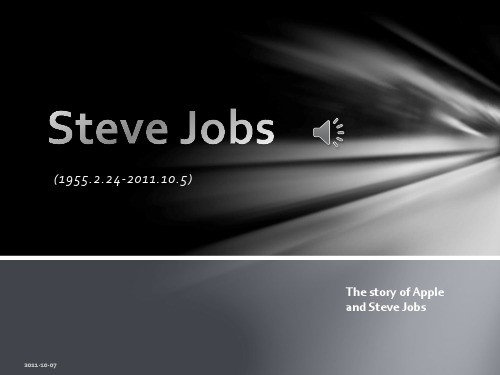
Evaluate评价
His pursuit of the details - "I want to make icons do look lick with his tongue"; his pursuit of perfection - "To be able to sleep at night, to the aesthetic and quality throughout the pursuit of excellence"; His flair for innovation - "Do not let the noise of others opinions drown your inner voice, heart and intuition to have the courage to listen to the call." - He is Apple's "The Godfather" Jobs. "A pirate, a paranoid, a perfect combination of art and technology of IT leaders, a person who changed the world."
End of life生命尾声
August 24, 2011, Jobs resigned from the post of CEO. Local time on October 5, 2011, died aged 56. 2011年8月24日,乔布斯辞去CEO一职。于当地 时间2011年10月5日逝世,终年56岁。
史蒂夫 乔布斯(中英对照)

史蒂夫•乔布斯(1955-2011)10月5日,星期三,史蒂夫•乔布斯与世长辞,享年56岁。
乔布斯永远地改变了我们认知科技、应用科技的方式,在横跨个人电脑到音乐产业的广泛领域都打上自己鲜明的烙印。
在此,《财富》杂志(Fortune)将逐一回顾他留给我们的10大遗产。
Steve Jobs (1955-2011)Steve Jobs passed away Wednesday, Oct. 5 at age 56. Fortune looks back at how he changed the way we think about and use technology forever, putting his own stamp on everything from the personal computer to the music industry.设计在史蒂夫眼中,产品的外观、手感和操作远远超过纯粹的技术规格。
PC制造商还在追逐更快的处理器速度,而乔布斯却在追求更加智能、简单灵巧的设计。
苹果公司(Apple)一位前任员工回忆起乔布斯曾经有一次在公司召开的会议上认真思索Mini Cooper 的魅力所在。
(他的一位同事当时正在销售这款汽车。
)他回忆道:“最后,他得出的结论是,这款汽车之所以炫酷出众,正是因为它小巧玲珑。
史蒂夫认为,当时正是苹果公司充分利用金属材料的最佳时机。
当时,大部分电脑制造商仍在使用塑料,但他认为,要想使电脑更加小巧,必须很好地利用金属材料。
”这一举措最终带来了回报:苹果公司的钛铝合金笔记本电脑备受追捧。
最近推出的MacBook Air型号笔记本也被视为设计、价格与性能三者完美结合的典范。
DesignFor Jobs, how a product looked, felt and responded trumped raw technical specifications. While PC makers chased after faster processor speeds, Jobs pursued clever, minimalist design.One ex-Apple employee remembers sitting in a meeting with Jobs, who was mulling over the appeal of Mini Coopers. (An old coworker of his sold them at the time.)"He finally decided they were cool because they were small," he says. "Steve said that's when he knew Apple had to get really good at metal. Most computer makers at the time were all using plastic, but he knew to get smaller, you had to get metal really, really well."The move paid off: Apple's titanium-turned-aluminum notebooks became bestsellers. The most recent MacBook Air models have been held up as examples of the ideal intersection of design, price and performance.音乐进入新千年以来,音乐产业迅速向数字内容传递方式转变,上百万用户通过Napster等在线音乐服务网站非法下载音乐,这种混乱局面使得音乐出版公司MusicThe new millennium was all about a rapid shift to digital content delivery, a disruption that sent music publishers scrambling to preserve their疲于应付,只能在日益调低底线的痛苦中苦苦挣扎。
GeorgeWalkerBush英文简介
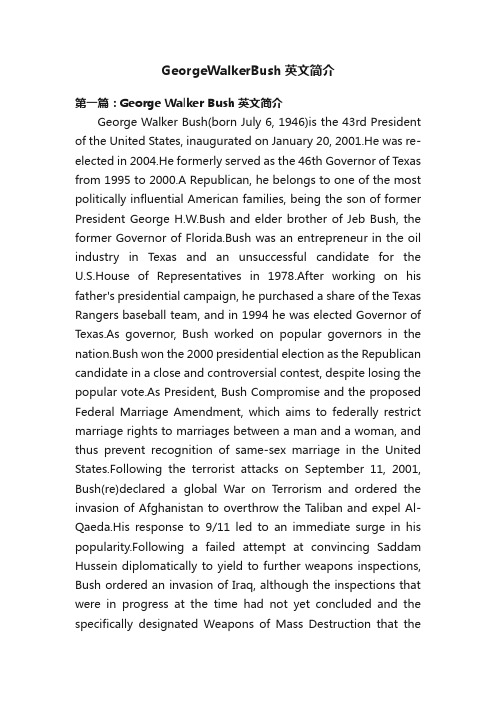
GeorgeWalkerBush英文简介第一篇:George Walker Bush英文简介George Walker Bush(born July 6, 1946)is the 43rd President of the United States, inaugurated on January 20, 2001.He was re-elected in 2004.He formerly served as the 46th Governor of Texas from 1995 to 2000.A Republican, he belongs to one of the most politically influential American families, being the son of former President George H.W.Bush and elder brother of Jeb Bush, the former Governor of Florida.Bush was an entrepreneur in the oil industry in Texas and an unsuccessful candidate for the U.S.House of Representatives in 1978.After working on his father's presidential campaign, he purchased a share of the Texas Rangers baseball team, and in 1994 he was elected Governor of Texas.As governor, Bush worked on popular governors in the nation.Bush won the 2000 presidential election as the Republican candidate in a close and controversial contest, despite losing the popular vote.As President, Bush Compromise and the proposed Federal Marriage Amendment, which aims to federally restrict marriage rights to marriages between a man and a woman, and thus prevent recognition of same-sex marriage in the United States.Following the terrorist attacks on September 11, 2001, Bush(re)declared a global War on Terrorism and ordered the invasion of Afghanistan to overthrow the Taliban and expel Al-Qaeda.His response to 9/11 led to an immediate surge in his popularity.Following a failed attempt at convincing Saddam Hussein diplomatically to yield to further weapons inspections, Bush ordered an invasion of Iraq, although the inspections that were in progress at the time had not yet concluded and the specifically designated Weapons of Mass Destruction that theCoalition of the Willing invaded to capture have never been found.Following the overthrow of Hussein's regime, Bush committed the U.S.to establishing democracy in the Middle East, and specifically in both Afghanistan and Iraq in the short term.A self-described “war President”, Bush won re-election in 2004 after an intense and heated election campaign, becoming the first candidate to win a majority vote in 16 years, as well as the largest tally of votes for any presidential candidate.Since re-election in 2004, Bush has received increasingly heated criticisms for his management of the war, as well as domestic issues, which have caused his popularity to decline.President Bush is married to Laura Welch Bush,a former teacher and librarian, and they havetwin daughters, Barbara and Jenna.The Bushfamily also includes two dogs, Barney andMiss Beazley, and a cat, Willie.“I feel like God wants me to run for president.I can't explain it, but I sense my country is going to need me.Something is going to happen and, at that time, my country is going to need me.I know it won't be easy on me or my family, but God wants me to do it.”So said then-Governor George W.Bush to a few trusted friends about the 2000 presidential race.As president, Bush has continued to bring his deep religious belief to his job-a fact that has delighted the nation's conservative Christians and distressed many others.That Bush has appointed likeminded Christians to high posts-including Secretary of State John Ashcroft, who was once quoted as saying that the controversy.So have Bush's support and funding of faith-based initiatives.And with his administration swearing to keep the words in the Pledge of Allegiance, a matter which the Supreme Court will take underconsideration this, many are left wondering: Whatever happened to the separation between church and state?But Bush's faith is an asset to his presidency and not a weakness, argues Stephen Mansfield in his provocative new book, The Faith of George Bush.In this spiritual biography of the president, Mansfield shows that Bush uses his faith to help him be a better leader(and man and husband and parent)without allowing it to dictate policy decisions.Said his close friend, Commerce Secretary Don Evans: “It gives him a desire to serve others and a very clear sense of what is good and what • Bush's tongue started slipping almost as soon as he started talking at a business forum on • ”Mr.Prime Minister, thank you for your introduction,“ he told Prime Minister John Howard.”Thank you for being such a fine host for the OPEC summit.“• As the audience of several hundred people erupted in laughter, Bush corrected himselfand joked, ”He invited me to the OPEC summit next year.“ Australia has never been a member of the Organization of the Petroleum Exporting Countries.•Later in his speech, Bush recounted how Howard had gone to visit ”Austrian troops“ last year in Iraq.There are, in fact, no Austrian troops there.But Australia has about 1,500 Australian military personnel in and around the country. Grammar Errors• “There…s too many issues left unresolved.”(is →are)• “Will the highways on the Internet become more few?”(more few→fewer)• ”We look forward to hearing your vision, so we can more better do our job.“(more better→better)• “You teach a child to read, and he or her will be able to pass a literacy test.”(he or her →he or she)Vocabulary errors• “Keep good relations with the Grecians“(Greek→ Grecians)• “If the tarriers and bariffs are torn down, this economy will grow.”(barriers and tariffs→tarriers and bar iffs)• “They misunderestimated me.”(underestimated→ misunderestimated• I'm really looking forward to watching the American Olympic team compete, particularlywith the mighty Chinese team.”• Millions of Americans and Chinese must be saying that, and hoping to get a ticket forwhat has been billed as the clash of titans.• But those words were spoken by none other than US President George W.Bush.• At his meeting with President Hu Jintao on the sidelines of the G8 Summit yesterday,Bush asked, in a lighter vein, whether he could get tickets to the US-China basketball game at the Beijing Olympics.The president has been hyperactively engaged in seeking to solve several of the world's most pressing problems.Among the more dramatic examples: his installation of a new sprinkler systemfor watering the lawn;erecting a gate at the end of the driveway and cutting new bike trails across the ranch.Life sure is busy for the 43rd president of the US.While the world appears to be collapsing around his head – in no small part thanks to the legacy he bequeathed his successor Barack Obama –he isintensely focused on rebuilding his own private universe.Top of the list of George Bush's priorities these past 100 days has been what he calls “replenishing the ol' coffers”.Which tra nslates into plain Texan as making cash.It may be hard to imagine why anyone would want to pay $400(about £270)a ticket to hear the former incumbent of the White House explain how he came to make his most important executive decisions.Perhaps they are keen to learn how not to make important executive decisions –along the lines of the motivational speaker, but in reverse.第二篇:英文简介我叫李永亮。
(完整版)乔布斯中英文简介
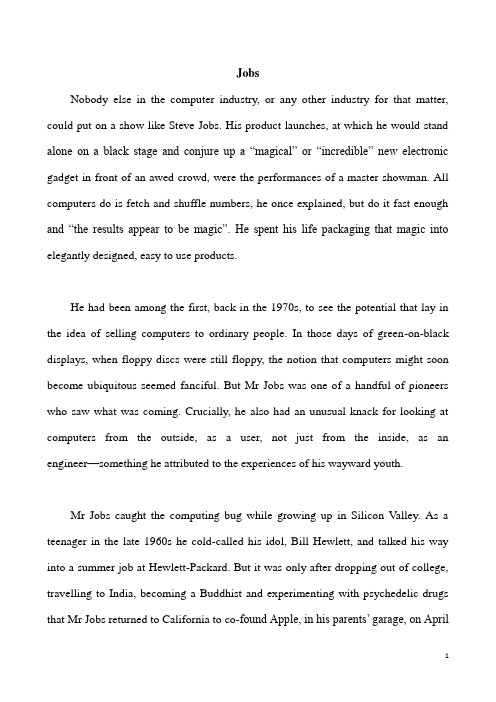
JobsNobody else in the computer industry, or any other industry for that matter, could put on a show like Steve Jobs. His product launches, at which he would stand alone on a black stage and conjure up a “magical” or “incredible” new electronic gadget in front of an awed crowd, were the performances of a master showman. All computers do is fetch and shuffle numbers, he once explained, but do it fast enough and “the results appear to be magic”. He spent his life packaging that magic into elegantly designed, easy to use products.He had been among the first, back in the 1970s, to see the potential that lay in the idea of selling computers to ordinary people. In those days of green-on-black displays, when floppy discs were still floppy, the notion that computers might soon become ubiquitous seemed fanciful. But Mr Jobs was one of a handful of pioneers who saw what was coming. Crucially, he also had an unusual knack for looking at computers from the outside, as a user, not just from the inside, as an engineer—something he attributed to the experiences of his wayward youth.Mr Jobs caught the computing bug while growing up in Silicon Valley. As a teenager in the late 1960s he cold-called his idol, Bill Hewlett, and talked his way into a summer job at Hewlett-Packard. But it was only after dropping out of college, travelling to India, becoming a Buddhist and experimenting with psychedelic drugs that Mr Jobs returned to California to co-found Apple, in his parents’ garage, on AprilFools’ Day 1976. “A lot of people in our industry haven’t had very diverse experiences,” he once said. “So they don’t have enough dots to connect, and they end up with very linear solutions.” Bill Gates, he suggested, would be “a broader guy if he had dropped acid once or gone off to an ashram when he was younger”.Dropping out of his college course and attending calligraphy classes instead had, for example, given Mr Jobs an apparently useless love of typography. But support for a variety of fonts was to prove a key feature of the Macintosh, the pioneering mouse-driven, graphical computer that Apple launched in 1984. With its windows, icons and menus, it was sold as “the computer for the rest of us”. Having made a fortune from Apple’s initial success, Mr Jobs expected to sell “zillions” of his new machines. But the Mac was not the mass-market success Mr Jobs had hoped for, and he was ousted from Apple by its board.Yet this apparently disastrous turn of events turned out to be a blessing: “the best thing that could have ever happened to me”, Mr Jobs later called it. He co-founded a new firm, Pixar, which specialised in computer graphics, and NeXT, another computer-maker. His remarkable second act began in 1996 when Apple, having lost its way, acquired NeXT, and Mr Jobs returned to put its technology at the heart of a new range of Apple products. And the rest is history: Apple launched the iMac, the iPod, the iPhone and the iPad, and (briefly) became the world’s most valuable listed company. “I’m pretty sure none of this would have happened if Ihadn’t been fired from Apple,” Mr Jobs said in 2005. When his failing health forced him to step down as Apple’s boss in 2011, he was hailed as the greatest chief executive in history. Oh, and Pixar, his side project, produced a string of hugely successful animated movies.In retrospect, Mr Jobs was a man ahead of his time during his first stint at Apple. Computing’s early years were dominated by technical types. But his emphasis on design and ease of use gave him the edge later on. Elegance, simplicity and an understanding of other fields came to matter in a world in which computers are fashion items, carried by everyone, tha t can do almost anything. “Technology alone is not enough,” said Mr Jobs at the end of his speech introducing the iPad, in January 2010. “It’s technology married with liberal arts, married with humanities, that yields the results that make our hearts sing.” It was an unusual statement for the head of a technology firm, but it was vintage Steve Jobs.His interdisciplinary approach was backed up by an obsessive attention to detail.A carpenter making a fine chest of drawers will not use plywood on the back, even though nobody will see it, he said, and he applied the same approach to his products. “For you to sleep well at night, the aesthetic, the quality, has to be carried all the way through.” He insisted that the first Macintosh should have no internal c ooling fan, so that it would be silent—putting user needs above engineering convenience. He called an Apple engineer one weekend with an urgent request: the colour of one letterof an on-screen logo on the iPhone was not quite the right shade of yellow. He often wrote or rewrote the text of Apple’s advertisements himself.His on-stage persona as a Zen-like mystic notwithstanding, Mr Jobs was an autocratic manager with a fierce temper. But his egomania was largely justified. He eschewed market researchers and focus groups, preferring to trust his own instincts when evaluat ing potential new products. “A lot of times, people don’t know what they want until you show it to them,” he said. His judgment proved uncannily accurate: by the end of his career the hits far outweighed the misses. Mr Jobs was said by an engineer in the early years of Apple to emit a “reality distortion field”, such were his powers of persuasion. But in the end he changed reality, channelling the magic of computing into products that reshaped music, telecoms and media. The man who said in his youth that he wanted to “put a ding in the universe” did just that.以下为中文评论全文:到目前为止,世界上还没有哪个计算机行业或者其他任何行业的领袖能够像乔布斯那样举办出一场万众瞩目的盛会。
Steve Jobs生平简介

Steve Jobs生平简介(中英文)NOBODY else in the computer industry, or any other industry for that matter, could put on a show like Steve Jobs. His product launches, at which he would stand alone on a black stage and conjure up a “magical”or “incredible”new electronic gadget in front of an awed crowd, were the performances of a master showman. All computers do is fetch and shuffle numbers, he once explained, but do it fast enough and “the results appear to be magic”. He spent his life packaging that magic into elegantly designed, easy to use products.He had been among the first, back in the 1970s, to see the potential that lay in the idea of selling computers to ordinary people. In those days of green-on-black displays, when floppy discs were still floppy, the notion that computers might soon become ubiquitous seemed fanciful. But Mr Jobs was one of a handful of pioneers who saw what was coming. Crucially, he also had an unusual knack for looking at computers from the outside, as a user, not just from the inside, as an engineer—something he attributed to the experiences of his wayward youth.Mr Jobs caught the computing bug while growing up in Silicon Valley. As a teenager in the late 1960s he cold-called his idol, Bill Hewlett, and talked his way into a summer job at Hewlett-Packard. But it was only after dropping out of college, travelling to India, becoming a Buddhist and experimenting with psychedelic drugs that Mr Jobs returned to California to co-found Apple, in his parents’garage, onApril Fools’Day 1976. “A lot of people in our industry haven’t had very diverse experiences,”he once said. “So they don’t have enough dots to connect, and they end up with very linear solutions.”Bill Gates, he suggested, would be “a broader guy if he had dropped acid once or gone off to an ashram when he was younger”.Dropping out of his college course and attending calligraphy classes instead had, for example, given Mr Jobs an apparently useless love of typography. But support for a variety of fonts was to prove a key feature of the Macintosh, the pioneering mouse-driven, graphical computer that Apple launched in 1984. With its windows, icons and menus, it was sold as “the computer for the rest of us”. Having made a fortune from Apple’s initial success, Mr Jobs expected to sell “zillions”of his new machines. But the Mac was not the mass-market success Mr Jobs had hoped for, and he was ousted from Apple by its board.Yet this apparently disastrous turn of events turned out to be a blessing: “the best thing that could have ever happened to me”, Mr Jobs later called it. Heco-founded a new firm, Pixar, which specialised in computer graphics, and NeXT, another computer-maker. His remarkable second act began in 1996 when Apple, having lost its way, acquired NeXT, and Mr Jobs returned to put its technology at the heart of a new range of Apple products. And the rest is history: Apple launched the iMac, the iPod, the iPhone and the iPad, and (briefly) became the world’s most valuable listed company. “I’m pretty sure none of this would have happened if I hadn’t been fired from Apple,”Mr Jobs said in 2005. When his failing health forced him to step down as Apple’s boss in 2011, he was hailed as the greatestchief executive in history. Oh, and Pixar, his side project, produced a string of hugely successful animated movies.In retrospect, Mr Jobs was a man ahead of his time during his first stint at Apple. Computing’s early years were dominated by technical types. But his emphasis on design and ease of use gave him the edge later on. Elegance, simplicity and an understanding of other fields came to matter in a world in which computers are fashion items, carried by everyone, that can do almost anything. “Technology alone is not enough,”said Mr Jobs at the end of his speech introducing the iPad, in January 2010. “It’s technology married with liberal arts, married with humanities, that yields the results that make our hearts sing.”It was an unusual statement for the head of a technology firm, but it was vintage Steve Jobs.His interdisciplinary approach was backed up by an obsessive attention to detail. A carpenter making a fine chest of drawers will not use plywood on the back, even though nobody will see it, he said, and he applied the same approach to his products. “For you to sleep well at night, the aesthetic, the quality, has to be carried all the way through.”He insisted that the first Macintosh should have no internal cooling fan, so that it would be silent—putting user needs above engineering convenience. He called an Apple engineer one weekend with an urgent request: the colour of one letter of an on-screen logo on the iPhone was not quite the right shade of yellow. He often wrote or rewrote the text of Apple’s advertisements himself.His on-stage persona as a Zen-like mystic notwithstanding, Mr Jobs was an autocratic manager with a fierce temper. But his egomania was largely justified. He eschewed market researchers and focus groups, preferring to trust his own instincts when evaluating potential new products. “A lot of times, people don’t know what they want until you show it to them,”he said. His judgment proved uncannily accurate: by the end of his career the hits far outweighed the misses. Mr Jobs was said by an engineer in the early years of Apple to emit a “reality distortion field”, such were his powers of persuasion. But in the end he changed reality, channelling the magic of computing into products that reshaped music, telecoms and media. The man who said in his youth that he wanted to “put a ding in the universe”did just that.以下为中文评论全文:到目前为止,世界上还没有哪个计算机行业或者其他任何行业的领袖能够像乔布斯那样举办出一场万众瞩目的盛会。
史蒂夫乔布斯(中英对照)
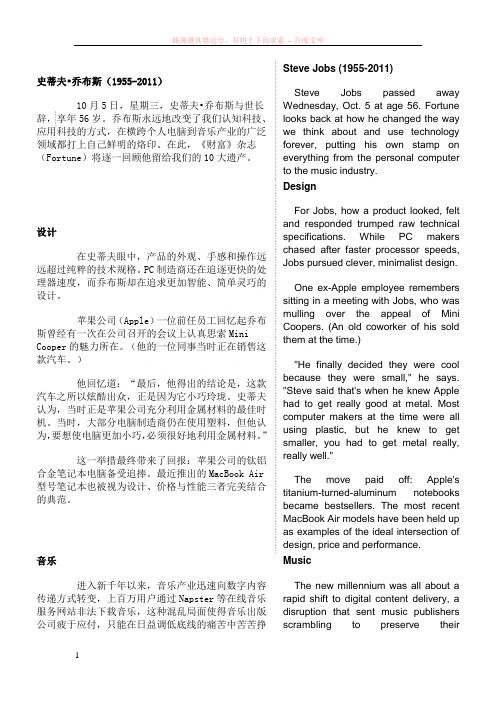
史蒂夫•乔布斯(1955-2011)10月5日,星期三,史蒂夫•乔布斯与世长辞,享年56岁。
乔布斯永远地改变了我们认知科技、应用科技的方式,在横跨个人电脑到音乐产业的广泛领域都打上自己鲜明的烙印。
在此,《财富》杂志(Fortune)将逐一回顾他留给我们的10大遗产。
Steve Jobs (1955-2011)Steve Jobs passed away Wednesday, Oct. 5 at age 56. Fortune looks back at how he changed the way we think about and use technology forever, putting his own stamp on everything from the personal computer to the music industry.设计在史蒂夫眼中,产品的外观、手感和操作远远超过纯粹的技术规格。
PC制造商还在追逐更快的处理器速度,而乔布斯却在追求更加智能、简单灵巧的设计。
苹果公司(Apple)一位前任员工回忆起乔布斯曾经有一次在公司召开的会议上认真思索Mini Cooper的魅力所在。
(他的一位同事当时正在销售这款汽车。
)他回忆道:“最后,他得出的结论是,这款汽车之所以炫酷出众,正是因为它小巧玲珑。
史蒂夫认为,当时正是苹果公司充分利用金属材料的最佳时机。
当时,大部分电脑制造商仍在使用塑料,但他认为,要想使电脑更加小巧,必须很好地利用金属材料。
”这一举措最终带来了回报:苹果公司的钛铝合金笔记本电脑备受追捧。
最近推出的MacBook Air 型号笔记本也被视为设计、价格与性能三者完美结合的典范。
DesignFor Jobs, how a product looked, felt and responded trumped raw technical specifications. While PC makers chased after faster processor speeds, Jobs pursued clever, minimalist design.One ex-Apple employee remembers sitting in a meeting with Jobs, who was mulling over the appeal of Mini Coopers. (An old coworker of his sold them at the time.)"He finally decided they were cool because they were small," he says. "Steve said that's when he knew Apple had to get really good at metal. Most computer makers at the time were all using plastic, but he knew to get smaller, you had to get metal really, really well."The move paid off: Apple's titanium-turned-aluminum notebooks became bestsellers. The most recent MacBook Air models have been held up as examples of the ideal intersection of design, price and performance.音乐进入新千年以来,音乐产业迅速向数字内容传递方式转变,上百万用户通过Napster等在线音乐服务网站非法下载音乐,这种混乱局面使得音乐出版公司疲于应付,只能在日益调低底线的痛苦中苦苦挣MusicThe new millennium was all about a rapid shift to digital content delivery, a disruption that sent music publishers scrambling to preserve their扎。
乔布斯英文简介

乔布斯英文简介1. IntroductionSteve Jobs, born on February 24, 1955, was an American business magnate, industrial designer, and inventor. He co-founded Apple Inc., one of the world’s most valuable companies in terms of market capitalization. Jobs played a significant role in revolutionizing the computer, music, and smartphone industries with his visionary leadership and innovative products. This article provides a brief overview of Steve Jobs’ life and his contributions to the technology world.2. Early Life and EducationSteven Paul Jobs was born to Joanne Schieble and Abdulfattah Jandali in San Francisco, California. Shortly after his birth, he was adopted by Paul and Clara Jobs. Growing up in Mountain View, California, Jobs developed an early interest in electronics and technology. He attended Homestead High School and later enrolled in Reed College but dropped out after six months.3. Apple Inc. and Early SuccessIn 1976, Jobs co-founded Apple Computer Inc. with Steve Wozniak and Ronald Wayne. The company gained early success with the Apple II, a personal computer that became popular among computer enthusiasts and different industries. Despite internal conflicts, Apple continued to innovate and introduced the Macintosh in 1984, featuring a graphical user interface and a mouse. However, due to differences with the company’s board, Jobs left Apple in 1985.4. NeXT Inc. and PixarAfter leaving Apple, Jobs founded NeXT Inc., a computer platform development company. NeXT focused on creating high-quality workstations for the education and bus iness sectors. Although NeXT hardware didn’t achieve widespread success, the company’s operating system became widely influential and eventually formed the foundation for Mac OS X.During his time at NeXT, Jobs also acquired Pixar Animation Studios from Lucasfilm Ltd. Under his leadership as CEO, Pixar became a major player in the animation industry and produced several critically acclaimed movies, including Toy Story, Finding Nemo, and The Incredibles. In 2006, The Walt Disney Company acquired Pixar, makin g Jobs Disney’s largest individual shareholder.5. Return to Apple and Later YearsIn 1996, Apple acquired NeXT Inc., bringing Jobs back to the company he co-founded. Initially, he served as an advisor but soon became interim CEO. Under his guidance, Apple experienced a remarkable turnaround with the introduction of iconic products like the iMac, iPod, iPhone, and iPad. These products revolutionized their respective industries and propelled Apple to become the most valuable company in the world.Despite facing health issues, Jobs continued to lead Apple until his resignation in August 2011. He passed away on October 5, 2011, leaving behind a legacy of innovation and creativity that continues to inspire generations of entrepreneurs and technology enthusiasts.6. ConclusionSteve Jobs’ contributions to the technology industry were nothing short of revolutionary. Through his visionary leadership and relentless pursuit of excellence, he transformed Apple Inc. into a global powerhouse and shaped the way we communi cate, listen to music, and interact with technology. Jobs’ unwavering commitment to innovation and his ability to create products that blended art and technology have cemented his place as one of the greatest entrepreneurs and inventors of our time.。
乔布斯中英文wiki简介

史蒂芬·保罗·乔布斯(英语:Steven Paul Jobs,1955年2月24日-2011年10月5日),简称为史蒂夫·乔布斯(英语:Steve Jobs),苹果公司的创办人之一,并曾任苹果公司的董事会主席、首席运行官,同时也是前皮克斯动画工作室的董事长及首席执行官(皮克斯动画工作室已于2006年被迪士尼收购[3])。
乔布斯还曾是迪士尼公司的董事会成员和最大个人股东[9]。
乔布斯被认为是电脑业界与娱乐业界的标志性人物,同时人们也把他视作麦金塔电脑、iPod、iTunes Store、iPhone、iPad等知名数字产品的缔造者[10]。
2007年,史蒂夫·乔布斯被《财富》杂志评为了年度最强有力商人[11]。
乔布斯的生涯极大地影响了硅谷风险创业的传奇,他将美学至上的设计理念在全世界推广开来。
他对简约及便利设计的推崇为他赢得了许多忠实追随者[12]。
乔布斯与沃兹尼亚克共同使个人电脑在70年代末至80年代初流行开来,他也是第一个看到鼠标的商业潜力的人[13]。
乔布斯在1985年苹果高层权力斗争中离开苹果并成立了NeXT公司,瞄准专业市场。
1997年,苹果收购NeXT,乔布斯回到苹果接任首席执行官。
2011年8月24日,乔布斯宣布辞去苹果首席执行官职务,10月5日因身患胰腺癌去世,享年56岁[14]。
Steven Paul"Steve" Jobs(February 24, 1955 –October 5, 2011)[2][6][7]was an American computer entrepreneur and inventor. He was co-founder,[8] chairman, and chief executive officer of Apple Inc.[9][10] Jobs also previously served as chief executive of Pixar Animation Studios; he became a member of the board of directors of The Walt Disney Company in 2006, following the acquisition of Pixar by Disney. He was credited in Toy Story (1995) as an executive producer.[11]In the late 1970s, Jobs, with Apple co-founder Steve Wozniak, Mike Markkula[8]and others designed, developed, and marketed one of the first commercially successful lines of personal computers, the Apple II series. In the early 1980s, Jobs was among the first to see the commercial potential of Xerox PARC's mouse-driven graphical user interface, which led to the creation of the Macintosh.[12][13] After losing a power struggle with the board of directors in 1985,[14][15] Jobs resigned from Apple and founded NeXT, a computer platform development company specializing in the higher-education and business markets. Apple's subsequent 1996 buyout of NeXT brought Jobs back to the company he co-founded, and he served as its CEO from 1997 until 2011.In 1986, he acquired the computer graphics division of Lucasfilm Ltd which was spun off as Pixar Animation Studios.[16] He remained CEO and majority shareholder at 50.1 percent until its acquisition by The Walt Disney company in 2006.[17]Consequently Jobs became Disney's largest individual shareholder at 7 percent and a member of Disney's Board of Directors.[18][19] On August 24, 2011, Jobs announced his resignation from his role as Apple's CEO.On October 5, 2011, Apple announced that Jobs had died.[20][21][22] He was 56 years old.。
乔布斯生平简介(中英文对照)精编版
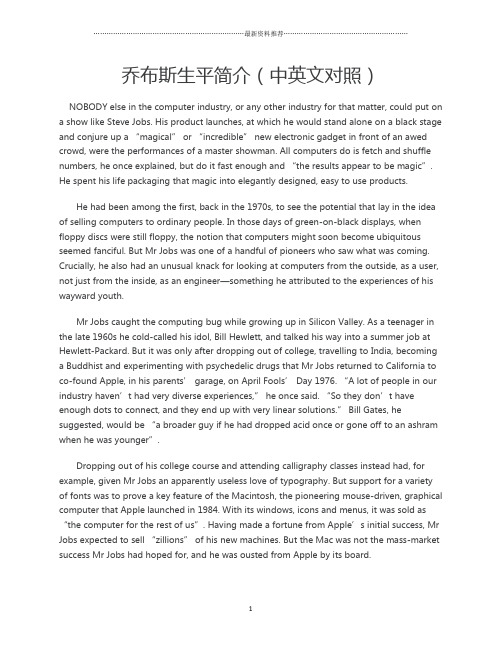
乔布斯生平简介(中英文对照)NOBODY else in the computer industry, or any other industry for that matter, could put on a show like Steve Jobs. His product launches, at which he would stand alone on a black stage and conjure up a “magical” or “incredible” new electronic gadget in front of an awed crowd, were the performances of a master showman. All computers do is fetch and shuffle numbers, he once explained, but do it fast enough and “the results appear to be magic”. He spent his life packaging that magic into elegantly designed, easy to use products.He had been among the first, back in the 1970s, to see the potential that lay in the idea of selling computers to ordinary people. In those days of green-on-black displays, when floppy discs were still floppy, the notion that computers might soon become ubiquitous seemed fanciful. But Mr Jobs was one of a handful of pioneers who saw what was coming. Crucially, he also had an unusual knack for looking at computers from the outside, as a user, not just from the inside, as an engineer—something he attributed to the experiences of his wayward youth.Mr Jobs caught the computing bug while growing up in Silicon Valley. As a teenager in the late 1960s he cold-called his idol, Bill Hewlett, and talked his way into a summer job at Hewlett-Packard. But it was only after dropping out of college, travelling to India, becoming a Buddhist and experimenting with psychedelic drugs that Mr Jobs returned to California to co-found Apple, in his parents’ garage, on April Fools’ Day 1976. “A lot of people in our industry haven’t had very diverse experiences,” he once said. “So they don’t have enough dots to connect, and they end up with very linear solutions.” Bill Gates, he suggested, would be “a broader guy if he had dropped acid once or gone off to an ashram when he was younger”.Dropping out of his college course and attending calligraphy classes instead had, for example, given Mr Jobs an apparently useless love of typography. But support for a variety of fonts was to prove a key feature of the Macintosh, the pioneering mouse-driven, graphical computer that Apple launched in 1984. With its windows, icons and menus, it was sold as “the computer for the rest of us”. Having made a fortune from Apple’s initial success, Mr Jobs expected to sell “zillions” of his new machines. But the Mac was not the mass-market success Mr Jobs had hoped for, and he was ousted from Apple by its board.Yet this apparently disastrous turn of events turned out to be a blessing: “the best thing that could have ever happened to me”, Mr Jobs later called it. He co-founded a new firm, Pixar, which specialised in computer graphics, and NeXT, another computer-maker. His remarkable second act began in 1996 when Apple, having lost its way, acquired NeXT, and Mr Jobs returned to put its technology at the heart of a new range of Apple products. And the rest is history: Apple launched the iMac, the iPod, the iPhone and the iPad, and (briefly) became the world’s most valuable listed company. “I’m pretty sure none of this would have happened if I hadn’t been fired from Apple,” Mr Jobs said in 2005. When his failing health forced him to step down as Apple’s boss in 2011, he was hailed as the greatest chief executive in history. Oh, and Pixar, his side project, produced a string of hugely successful animated movies.In retrospect, Mr Jobs was a man ahead of his time during his first stint at Apple. Computing’s early years were dominated by technical types. But his emphasis on design and ease of use gave him the edge later on. Elegance, simplicity and an understanding of other fields came to matter in a world in which computers are fashion items, carried by everyone, that can do almost anything. “Technology alone is not enough,” said Mr Jobs at the end of his speech introducing the iPad, in January 2010. “It’s technology married with liberal arts, married with humanities, that yields the results that make our hearts sing.” It was an unusual statement for the head of a technology firm, but it was vintage Steve Jobs.His interdisciplinary approach was backed up by an obsessive attention to detail. A carpenter making a fine chest of drawers will not use plywood on the back, even though nobody will see it, he said, and he applied the same approach to his products. “For you to sleep well at night, the aesthetic, the quality, has to be carried all the way through.” He insisted that the first Macintosh should have no internal cooling fan, so that it would be silent—putting user needs above engineering convenience. He called an Apple engineer one weekend with an urgent request: the colour of one letter of an on-screen logo on the iPhone was not quite the right shade of yellow. He often wrote or rewrote the text of Apple’s advertisements himself.His on-stage persona as a Zen-like mystic notwithstanding, Mr Jobs was an autocratic manager with a fierce temper. But his egomania was largely justified. He eschewed market researchers and focus groups, preferring to trust his own instincts when evaluating potential new products. “A lot of times, people don’t know what they want until you show it to them,” he said. His judgment proved uncannily accurate: by the end of his career the hitsfar outweighed the misses. Mr Jobs was said by an engineer in the early years of Apple to emit a “reality distortion field”, such were his powers of persuasion. But in the end he changed reality, channelling the magic of computing into products that reshaped music, telecoms and media. The man who said in his youth that he wanted to “put a ding in the universe” did just that.以下为中文评论全文:到目前为止,世界上还没有哪个计算机行业或者其他任何行业的领袖能够像乔布斯那样举办出一场万众瞩目的盛会。
Steven Paul乔布斯生平(中英文对照)
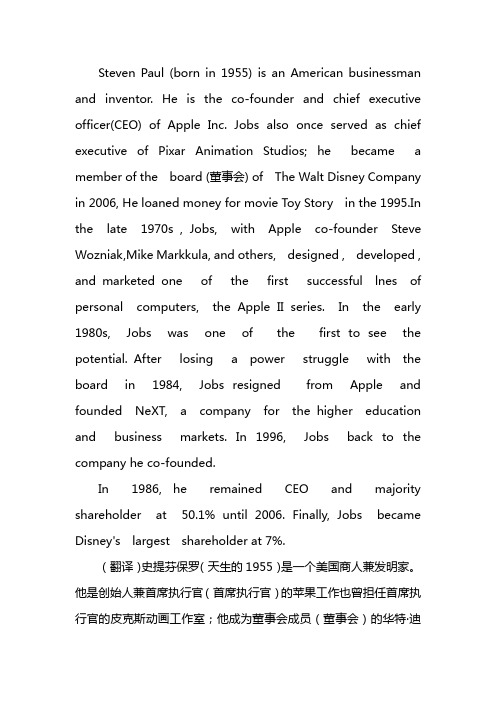
Steven Paul (born in 1955) is an American businessman and inventor. He is the co-founder and chief executive officer(CEO) of Apple Inc. Jobs also once served as chief executive of Pixar Animation Studios; he became a member of the board (董事会) of The Walt Disney Company in 2006, He loaned money for movie Toy Story in the 1995.In the late 1970s , Jobs, with Apple co-founder Steve Wozniak,Mike Markkula, and others, designed , developed , and marketed one of the first successful lnes of personal computers, the Apple II series. In the early 1980s, Jobs was one of the first to see the potential. After losing a power struggle with the board in 1984, Jobs resigned from Apple and founded NeXT, a company for the higher education and business markets. In 1996, Jobs back to the company he co-founded.In 1986, he remained CEO and majority shareholder at 50.1% until 2006. Finally, Jobs became Disney's largest shareholder at 7%.(翻译)史提芬保罗(天生的1955)是一个美国商人兼发明家。
《乔布斯传》最后一章:乔布斯自述(中英文对照)
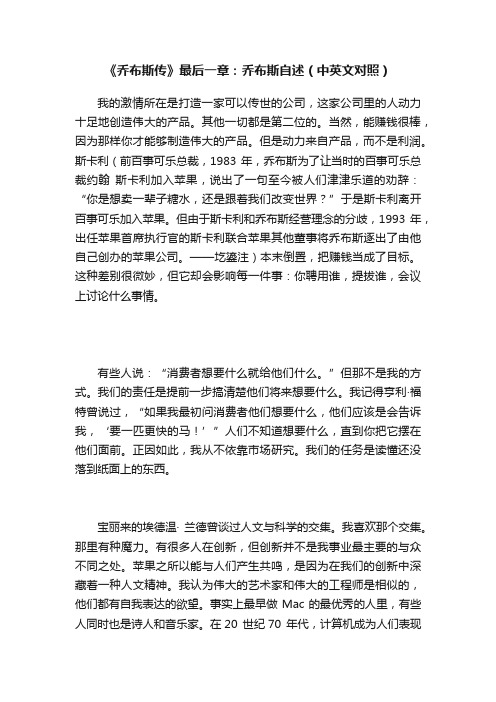
《乔布斯传》最后一章:乔布斯自述(中英文对照)我的激情所在是打造一家可以传世的公司,这家公司里的人动力十足地创造伟大的产品。
其他一切都是第二位的。
当然,能赚钱很棒,因为那样你才能够制造伟大的产品。
但是动力来自产品,而不是利润。
斯卡利(前百事可乐总裁,1983年,乔布斯为了让当时的百事可乐总裁约翰斯卡利加入苹果,说出了一句至今被人们津津乐道的劝辞:“你是想卖一辈子糖水,还是跟着我们改变世界?”于是斯卡利离开百事可乐加入苹果。
但由于斯卡利和乔布斯经营理念的分歧,1993年,出任苹果首席执行官的斯卡利联合苹果其他董事将乔布斯逐出了由他自己创办的苹果公司。
——圪鎏注)本末倒置,把赚钱当成了目标。
这种差别很微妙,但它却会影响每一件事:你聘用谁,提拔谁,会议上讨论什么事情。
有些人说:“消费者想要什么就给他们什么。
”但那不是我的方式。
我们的责任是提前一步搞清楚他们将来想要什么。
我记得亨利·福特曾说过,“如果我最初问消费者他们想要什么,他们应该是会告诉我,‘要一匹更快的马!’”人们不知道想要什么,直到你把它摆在他们面前。
正因如此,我从不依靠市场研究。
我们的任务是读懂还没落到纸面上的东西。
宝丽来的埃德温· 兰德曾谈过人文与科学的交集。
我喜欢那个交集。
那里有种魔力。
有很多人在创新,但创新并不是我事业最主要的与众不同之处。
苹果之所以能与人们产生共鸣,是因为在我们的创新中深藏着一种人文精神。
我认为伟大的艺术家和伟大的工程师是相似的,他们都有自我表达的欲望。
事实上最早做Mac的最优秀的人里,有些人同时也是诗人和音乐家。
在20 世纪70 年代,计算机成为人们表现创造力的一种方式。
一些伟大的艺术家,像列奥纳多· 达· 芬奇和米开朗基罗,同时也是精通科学的人。
米开朗基罗懂很多关于采石的知识,他不是只知道如何雕塑。
人们付钱让我们为他们整合东西,因为他们不能7天24小时地去想这些。
如果你对生产伟大的产品有极大的激情,它会推着你去追求一体化,去把你的硬件、软件以及内容管理都整合在一起。
- 1、下载文档前请自行甄别文档内容的完整性,平台不提供额外的编辑、内容补充、找答案等附加服务。
- 2、"仅部分预览"的文档,不可在线预览部分如存在完整性等问题,可反馈申请退款(可完整预览的文档不适用该条件!)。
- 3、如文档侵犯您的权益,请联系客服反馈,我们会尽快为您处理(人工客服工作时间:9:00-18:30)。
JobsNobody else in the computer industry, or any other industry for that matter, could put on a show like Steve Jobs. His product launches, at which he would stand alone on a black stage and conjure up a “magical” or “incredible” new electronic gadget in front of an awed crowd, were the performances of a master showman. All computers do is fetch and shuffle numbers, he once explained, but do it fast enough and “the results appear to be magic”. He spent his life packaging that magic into elegantly designed, easy to use products.He had been among the first, back in the 1970s, to see the potential that lay in the idea of selling computers to ordinary people. In those days of green-on-black displays, when floppy discs were still floppy, the notion that computers might soon become ubiquitous seemed fanciful. But Mr Jobs was one of a handful of pioneers who saw what was coming. Crucially, he also had an unusual knack for looking at computers from the outside, as a user, not just from the inside, as an engineer—something he attributed to the experiences of his wayward youth.Mr Jobs caught the computing bug while growing up in Silicon Valley. As a teenager in the late 1960s he cold-called his idol, Bill Hewlett, and talked his way into a summer job at Hewlett-Packard. But it was only after dropping out of college, travelling to India, becoming a Buddhist and experimenting with psychedelic drugs that Mr Jobs returned to California to co-found Apple, in his parents’ garage, on AprilFools’ Day 1976. “A lot of people in our industry haven’t had very diverse experiences,” he once said. “So they don’t have enough dots to connect, and they end up with very linear solutions.” Bill Gates, he suggested, would be “a broader guy if he had dropped acid once or gone off to an ashram when he was younger”.Dropping out of his college course and attending calligraphy classes instead had, for example, given Mr Jobs an apparently useless love of typography. But support for a variety of fonts was to prove a key feature of the Macintosh, the pioneering mouse-driven, graphical computer that Apple launched in 1984. With its windows, icons and menus, it was sold as “the computer for the rest of us”. Having made a fortune from Apple’s initial success, Mr Jobs expected to sell “zillions” of his new machines. But the Mac was not the mass-market success Mr Jobs had hoped for, and he was ousted from Apple by its board.Yet this apparently disastrous turn of events turned out to be a blessing: “the best thing that could have ever happened to me”, Mr Jobs later called it. He co-founded a new firm, Pixar, which specialised in computer graphics, and NeXT, another computer-maker. His remarkable second act began in 1996 when Apple, having lost its way, acquired NeXT, and Mr Jobs returned to put its technology at the heart of a new range of Apple products. And the rest is history: Apple launched the iMac, the iPod, the iPhone and the iPad, and (briefly) became the world’s most valuable listed company. “I’m pretty sure none of this would have happened if Ihadn’t been fired from Apple,” Mr Jobs said in 2005. When his failing health forced him to step down as Apple’s boss in 2011, he was hailed as the greatest chief executive in history. Oh, and Pixar, his side project, produced a string of hugely successful animated movies.In retrospect, Mr Jobs was a man ahead of his time during his first stint at Apple. Computing’s early years were dominated by technical types. But his emphasis on design and ease of use gave him the edge later on. Elegance, simplicity and an understanding of other fields came to matter in a world in which computers are fashion items, carried by everyone, tha t can do almost anything. “Technology alone is not enough,” said Mr Jobs at the end of his speech introducing the iPad, in January 2010. “It’s technology married with liberal arts, married with humanities, that yields the results that make our hearts sing.” It was an unusual statement for the head of a technology firm, but it was vintage Steve Jobs.His interdisciplinary approach was backed up by an obsessive attention to detail.A carpenter making a fine chest of drawers will not use plywood on the back, even though nobody will see it, he said, and he applied the same approach to his products. “For you to sleep well at night, the aesthetic, the quality, has to be carried all the way through.” He insisted that the first Macintosh should have no internal c ooling fan, so that it would be silent—putting user needs above engineering convenience. He called an Apple engineer one weekend with an urgent request: the colour of one letterof an on-screen logo on the iPhone was not quite the right shade of yellow. He often wrote or rewrote the text of Apple’s advertisements himself.His on-stage persona as a Zen-like mystic notwithstanding, Mr Jobs was an autocratic manager with a fierce temper. But his egomania was largely justified. He eschewed market researchers and focus groups, preferring to trust his own instincts when evaluat ing potential new products. “A lot of times, people don’t know what they want until you show it to them,” he said. His judgment proved uncannily accurate: by the end of his career the hits far outweighed the misses. Mr Jobs was said by an engineer in the early years of Apple to emit a “reality distortion field”, such were his powers of persuasion. But in the end he changed reality, channelling the magic of computing into products that reshaped music, telecoms and media. The man who said in his youth that he wanted to “put a ding in the universe” did just that.以下为中文评论全文:到目前为止,世界上还没有哪个计算机行业或者其他任何行业的领袖能够像乔布斯那样举办出一场万众瞩目的盛会。
